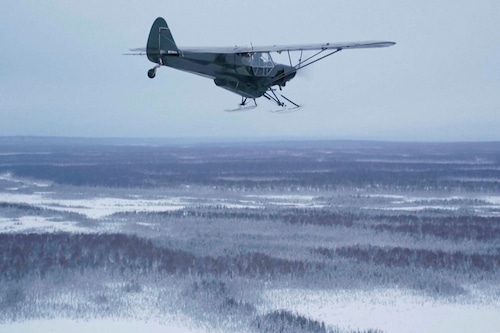You can’t count on DoorDash to bring Thanksgiving dinner—or any dinner—in the most isolated parts of Alaska. However, because of the Alaska Turkey Bomb, some people who live far from the grid are still able to enjoy turkeys this holiday season.
For the third consecutive year, a local called Esther Keim has been delivering frozen turkeys to those who are unable to go to the grocery store by flying low and slow in a small plane over rural areas of south-central Alaska.
About 20% of Alaska is reachable by road, making the majority of the state wilderness. Many people who live in isolated places depend on snowmobiles or tiny airplanes to get anywhere during the winter, and frozen rivers can serve as temporary highways.
Growing up on a homestead in Alaska, Keim’s family friend would airdrop turkeys to her family and other neighbors around the holidays. At other times, the pilot would bring Keim newspapers, occasionally with a bag of gum.
Her family still owns the homestead even though they moved to a more urban area of Alaska about 25 years ago. A few years ago, Keim learned about a local off-the-grid family that had little for Thanksgiving dinner, so she started her turkey delivery operation using a small plane she had repaired with her father.
“I was told,” Keim said, “that a squirrel for dinner did not split very far between three people.” I decided to airdrop them a turkey at that same time.
She made the decision to continue. Through social media posts and word-of-mouth, her work has expanded. She is bringing thirty-two frozen turkeys this year to residents of year-round cabins without access to the road.
By Tuesday, all but two had been delivered; Alaska’s erratic weather prevented the remaining two birds from being delivered.
Dave and Christina Luce, who reside on the Yentna River around 45 miles northwest of Anchorage, are among the recipients. They enjoy breathtaking vistas of mountains in all directions, including Denali, the highest mountain in North America, which is right to the north. However, once a month or so, they take a 90-minute snowmobile trek to the closest town during the winter.
Dave Luce stated, “We make fewer and fewer trips now that I’m 80 years old.” The sense of adventure has kind of faded.
Keim has been with them since she was a young child. They and a few neighbors will have plenty to eat from the 12-pound bird she delivered.
Dave Luce stated that it would make a wonderful Thanksgiving. She has been a wonderful friend and a true sweetheart.
Keim travels up to 100 kilometers from her base north of Anchorage toward the foothills of Denali each year to bring 30 to 40 turkeys.
She occasionally asks a turkey dropper to accompany her and throw the birds out. At other times, her friend Heidi Hastings pilots her own plane, and she is the one dumping turkeys.
Keim uses donations, typically from people contacting her on Facebook, to purchase roughly 20 turkeys at a time. Until she can get a flight, she lets them sit in the bed of her pickup after wrapping them in plastic waste bags.
She said, “Fortunately, it’s cold in Alaska, so I don’t have to worry about freezers.”
After informing families via social media about upcoming deliveries, she buzzes the house to get the residents to come outside.
Because they won’t know where to look if they don’t see the turkey fall, we won’t drop it until we see them leave the home or the cabin, she explained.
If there is a lot of snow, it can be very challenging to locate the turkey. According to Keim, the sole casualty to date has been a misplaced ham, but once a turkey went missing for five days before being located.
To make it easier to find, Keim likes to dump the turkey on a frozen lake.
“I am definitely not the best aim in terms of accuracy and hitting our target,” she joked. Although I’ve improved, I’ve never struck a person, a dog, a building, or a house.
The positive reactions she receives from families serve as her reward; some even record her dropping the turkeys and send her thank-you texts and videos.
According to Keim, they simply think it’s fantastic that we toss these items off the aircraft.
In the end, she wants to establish a charity in order to raise more money and connect with more individuals throughout the state. Furthermore, it need not end with turkeys.
“There are a lot of children in the villages,” she remarked. Perhaps adding a plush animal or something they can hold would be wonderful.
— The Associated Press’s Mark Thiessen and Becky Bohrer
Note: Every piece of content is rigorously reviewed by our team of experienced writers and editors to ensure its accuracy. Our writers use credible sources and adhere to strict fact-checking protocols to verify all claims and data before publication. If an error is identified, we promptly correct it and strive for transparency in all updates, feel free to reach out to us via email. We appreciate your trust and support!







